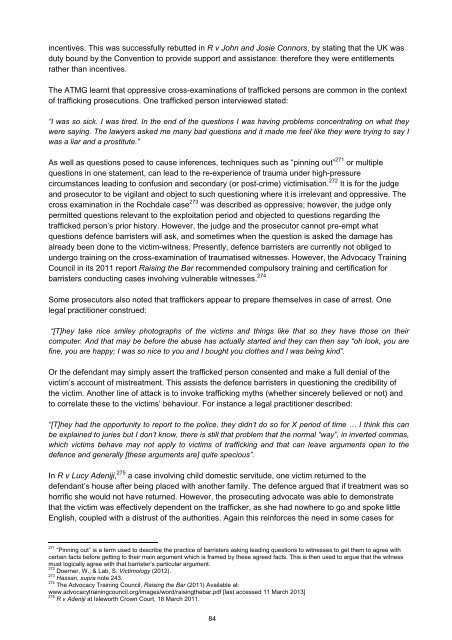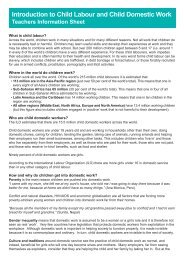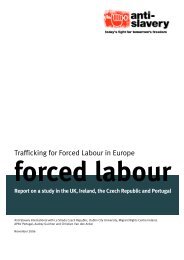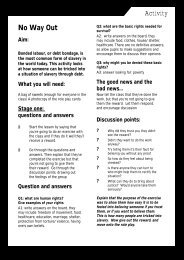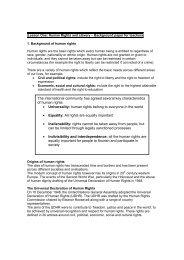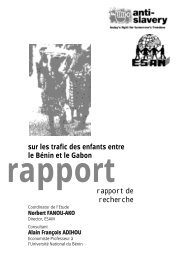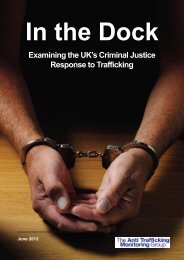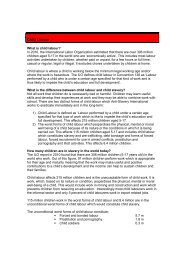In the Dock
Full report (1810.59KB) - Anti-Slavery International
Full report (1810.59KB) - Anti-Slavery International
You also want an ePaper? Increase the reach of your titles
YUMPU automatically turns print PDFs into web optimized ePapers that Google loves.
incentives. This was successfully rebutted in R v John and Josie Connors, by stating that <strong>the</strong> UK wasduty bound by <strong>the</strong> Convention to provide support and assistance: <strong>the</strong>refore <strong>the</strong>y were entitlementsra<strong>the</strong>r than incentives.The ATMG learnt that oppressive cross-examinations of trafficked persons are common in <strong>the</strong> contextof trafficking prosecutions. One trafficked person interviewed stated:“I was so sick. I was tired. <strong>In</strong> <strong>the</strong> end of <strong>the</strong> questions I was having problems concentrating on what <strong>the</strong>ywere saying. The lawyers asked me many bad questions and it made me feel like <strong>the</strong>y were trying to say Iwas a liar and a prostitute.”As well as questions posed to cause inferences, techniques such as “pinning out” 271 or multiplequestions in one statement, can lead to <strong>the</strong> re-experience of trauma under high-pressurecircumstances leading to confusion and secondary (or post-crime) victimisation. 272 It is for <strong>the</strong> judgeand prosecutor to be vigilant and object to such questioning where it is irrelevant and oppressive. Thecross examination in <strong>the</strong> Rochdale case 273 was described as oppressive; however, <strong>the</strong> judge onlypermitted questions relevant to <strong>the</strong> exploitation period and objected to questions regarding <strong>the</strong>trafficked person’s prior history. However, <strong>the</strong> judge and <strong>the</strong> prosecutor cannot pre-empt whatquestions defence barristers will ask, and sometimes when <strong>the</strong> question is asked <strong>the</strong> damage hasalready been done to <strong>the</strong> victim-witness. Presently, defence barristers are currently not obliged toundergo training on <strong>the</strong> cross-examination of traumatised witnesses. However, <strong>the</strong> Advocacy TrainingCouncil in its 2011 report Raising <strong>the</strong> Bar recommended compulsory training and certification forbarristers conducting cases involving vulnerable witnesses. 274Some prosecutors also noted that traffickers appear to prepare <strong>the</strong>mselves in case of arrest. Onelegal practitioner construed:“[T]hey take nice smiley photographs of <strong>the</strong> victims and things like that so <strong>the</strong>y have those on <strong>the</strong>ircomputer. And that may be before <strong>the</strong> abuse has actually started and <strong>the</strong>y can <strong>the</strong>n say “oh look, you arefine, you are happy; I was so nice to you and I bought you clo<strong>the</strong>s and I was being kind”.Or <strong>the</strong> defendant may simply assert <strong>the</strong> trafficked person consented and make a full denial of <strong>the</strong>victim’s account of mistreatment. This assists <strong>the</strong> defence barristers in questioning <strong>the</strong> credibility of<strong>the</strong> victim. Ano<strong>the</strong>r line of attack is to invoke trafficking myths (whe<strong>the</strong>r sincerely believed or not) andto correlate <strong>the</strong>se to <strong>the</strong> victims’ behaviour. For instance a legal practitioner described:“[T]hey had <strong>the</strong> opportunity to report to <strong>the</strong> police, <strong>the</strong>y didn’t do so for X period of time … I think this canbe explained to juries but I don’t know, <strong>the</strong>re is still that problem that <strong>the</strong> normal “way”, in inverted commas,which victims behave may not apply to victims of trafficking and that can leave arguments open to <strong>the</strong>defence and generally [<strong>the</strong>se arguments are] quite specious”.<strong>In</strong> R v Lucy Adeniji, 275 a case involving child domestic servitude, one victim returned to <strong>the</strong>defendant’s house after being placed with ano<strong>the</strong>r family. The defence argued that if treatment was sohorrific she would not have returned. However, <strong>the</strong> prosecuting advocate was able to demonstratethat <strong>the</strong> victim was effectively dependent on <strong>the</strong> trafficker, as she had nowhere to go and spoke littleEnglish, coupled with a distrust of <strong>the</strong> authorities. Again this reinforces <strong>the</strong> need in some cases for271“Pinning out” is a term used to describe <strong>the</strong> practice of barristers asking leading questions to witnesses to get <strong>the</strong>m to agree withcertain facts before getting to <strong>the</strong>ir main argument which is framed by <strong>the</strong>se agreed facts. This is <strong>the</strong>n used to argue that <strong>the</strong> witnessmust logically agree with that barrister’s particular argument.272Doerner, W., & Lab, S. Victimology (2012).273Hassan, supra note 243.274The Advocacy Training Council, Raising <strong>the</strong> Bar (2011) Available at:www.advocacytrainingcouncil.org/images/word/raising<strong>the</strong>bar.pdf [last accessed 11 March 2013]275R v Adeniji at Isleworth Crown Court, 18 March 2011.84


